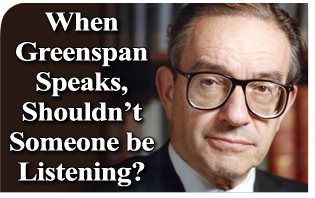 It used to be said that when Alan Greenspan spoke, people listened. In fact, the speeches of this Federal Reserve Chairman used to rock markets worldwide. But today, a lot has changed. No one seems to be acknowledging the alarming reports on the state of the global economy coming from very qualified minds. It is all business and trading as usual, even as the economy’s sluggish recovery appears to be confirming what the experts are saying.
It used to be said that when Alan Greenspan spoke, people listened. In fact, the speeches of this Federal Reserve Chairman used to rock markets worldwide. But today, a lot has changed. No one seems to be acknowledging the alarming reports on the state of the global economy coming from very qualified minds. It is all business and trading as usual, even as the economy’s sluggish recovery appears to be confirming what the experts are saying.
Yes, Alan Greenspan has just issued some very dire warnings, yet markets no longer jitter. The ageing finance oracle, who headed the Federal Reserve from 1987 to 2006, has pointed out disturbing economic trends in recent interviews. In one exclusive interview with FOX Business Network’s Neil Cavuto, for example, he said there is a “global problem of a shortage in productivity growth,” that is a disaster in the making.
It is not as if Greenspan is speaking in some obscure economic dialect as financial gurus often do. Rather, his present diagnosis is clear and logical. America suffers from an economy that is unbalanced and frenzied, and policy makers should concentrate on fixing it.
But Greenspan is no stranger to politics, so he is not optimistic about action in this election year. Real solutions are often painful and do not translate into votes. Nevertheless, he does list major areas of concern.
The first area is the most obvious. Economic growth levels in the United States and worldwide are not keeping up with what is needed to prosper. For now, he sees this as a future problem which is worsening with every passing year because nations fail to address it.
Although he does not use the word, the demographic time bomb is ticking. Greenspan notes how “a very profound long-term problem of economic growth [comes] at the time when in the Western world, there is a very large migration from being a worker into being a recipient of social benefits as it is called.”
This is Greenspan’s fancy way of saying insufficient numbers of workers are entering the workplace to support those retiring. More alarmingly, many younger people are opting out of employment altogether and going straight to social benefits. With the rising costs of these benefits nearing ten percent annually, the now “normal” two percent growth rates (seen as good in today’s troubled global economy), cannot possibly keep up with the growing needs.
Greenspan warns that all these benefits are legally mandated expenses in future budgets. Without some adjustment of these mandated funds, America will not “be able to fund what we are already legally obligated to spend.”
Another area of concern is that the instability caused by this coming crisis will lead to a Venezuela-type situation. The South American country is food-poor now and needs martial law to control its hungry people. Greenspan believes that “America is next.”
Finally, Greenspan lists other concerns such as an acceleration of the money supply, backfiring trade wars, and other matters that paint a very grim picture of the global economy in general, and the American economy in particular.
One may disagree with Greenspan’s perspective, especially considering his sympathies and friendship for Ayn Rand, and his central-bank-fixes-all solutions. His economic assessments typically exclude any considerations on the moral causes of the present problems, like population control or socialist ideologies.
However, his comments are compelling. Alan Greenspan joins others like George Soros, Carl Icahn, and experts at the IMF and the World Bank, who have recently predicted a coming crisis of Titanic proportion and scope. These warnings are certainly credible. After all, they are predicting the breakdown of their system, not that of others. If anyone should know the inside story, it is these finance leaders.
The most important point to be lamented is that icon-idols have spoken, and no one is paying attention.

